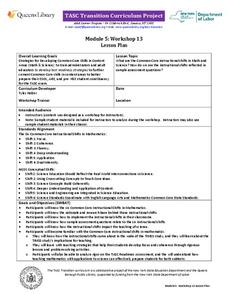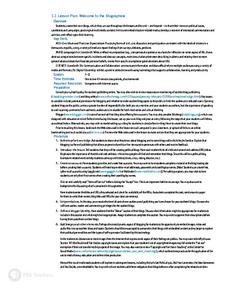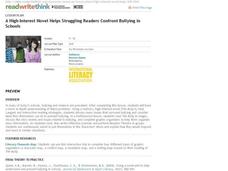Curated OER
How to Locate and Evaluate Information, Part III - Internet Sites
This is the third in a series of lessons scaffolding the research paper. It purports to teach researchers how to evaluate internet sites, but the lack of links, specific criteria, or site evaluation rubrics would require additional...
Curated OER
Accident Pinpoints Dangerous Site
Young scholars read about local accident sites and conduct research of areas of high incidence. They interview police and insurance agents and explore what can be done if a site has multiple accidents. They write a news feature about the...
Curated OER
Hey, Teacher, Leave My Kids Alone
What are the differences between homeschooling, traditional schooling, and unschooling? Middle and high schoolers examine the opinions of their peers on these varied types of education. After reading a New York Times article, they...
New York State Education Department
TASC Transition Curriculum: Workshop 13
The six instructional shifts in this workshop definitely move math and science teachers' understanding of instruction. The workshop, 13th out of a series of 15, asks participants to examine sample tests and to look at how the six...
New York State Education Department
TASC Transition Curriculum: Workshop 3
Teachers turning into high schoolers? It's not Freaky Friday! It's a thoughtful workshop that teaches participants how to plan professional development for staff. Third in a 15-part series, the workshop provides a platform for the other...
Curated OER
Using the Internet to Challenge Young Writers
Designed as a professional development exercise to introduce teachers to the Internet, the activities in this resource ask novice web surfers to access a series of sites, bookmark them, and answer question about information found on the...
Curated OER
“The Story of an Hour” Extension Activities: Teacher’s Guide and Notes
Enhance and extend instruction of "The Story of an Hour" by Kate Chopin with one or all of these ideas. You might want to cover characterization and summary, or improve understanding of context clues and irony. You can cover any...
New York State Education Department
TASC Transition Curriculum: Workshop 2
Flipped classrooms and online tools killed the chalkboard! An awesome, hands-on technology workshop asks teachers across all content areas. to examine model lessons, become familiar with research, and explore tech tools they can...
EngageNY
TASC Transition Curriculum: Workshop 9
Here's a workshop for teachers that rocks the academic world! Using earthquakes as a medium for instruction, educators learn about crosscutting engineering with science. Fun, hands-on, collaborative exercises encourage participants to...
Curated OER
Lesson Four: Comparatives and Superlatives
Put on your best smile, or a least a better one, for this lesson on superlatives and comparatives. English language learners first fill out a graphic organizer by finding other people in the class who are taller than they are, shorter...
Curated OER
"The Story of an Hour" Lesson 5: Teacher's Guide and Notes
Learning how to craft a compelling argument supported by evidence and logical reasoning is an essential skill. The fifth lesson in "The Story of An Hour" unit asks young scholars to formulate an argument in response to the question, 'Is...
Curated OER
"The Story of an Hour" Lesson 4: Teacher's Guide and Notes
Learning how to summarize can be a challenge. Guide your writers through the process of summarizing a story using the children's tale; I Want My Hat Back for practice. Class members then use this "Somebody, Wanted, But, So, Then"...
Curated OER
"The Story of an Hour" Lesson 3: Teacher's Guide and Notes
The third instructional activity in "The Story of an Hour" series introduces young readers to analogies; a literary device writers use to add depth to their stories. Instructors identify the three analogies in the tale, and class members...
Curated OER
"The Story of an Hour" Lesson 2: Teacher's Guide and Notes
After reading background information about Kate Chopin, pupils complete their shared reading of her short story, "The Story of an Hour." Participants then consider the irony of the ending.
Curated OER
"The Story of an Hour" Lesson 1: Teacher's Guide and Notes
Attitudes toward women have changed radically in the last hundred years. The first lesson in a six-part unit that uses Kate Chopin's short story "The Story of an Hour" as an anchor text begins with a shared reading of "The Role of Women...
Curated OER
"No News Like Ancient News"
Want to know more about Ancient history? Young historians will read a minimum of two web sites to complete the chart "Residents of Olympus". They choose one Greek god or goddess to research. This could be a small group activity or...
Curated OER
Welcome to the Blogosphere
Create a blog spot for your classroom and promote online discussions. There are several blogging websites listed here, and you can create one specific to each class or one collective site. Teach your learners how to post on the blog, and...
Curated OER
Myths, Folktales, & Fairy Tales
Introduce the concept of myths to your class. Using the link to "Myths Around the World," read a story aloud and have learners list characteristics of a myth. Readers then choose their own myths from the site and work in groups to answer...
Benjamin Franklin Tercentenary
Reading the Work of B. Franklin, Printer
Placing Ben Franklin’s ideas about a free press next to those embodied in the First Amendment sheds light on both. Learners interpret and compare two primary sources and then examine them in the light of a contemporary survey about...
History Alive!
Thomas Edison: Inventor, Lecturer and Prankster
It's no small wonder that a lightbulb has come to represent a bright idea. The light bulb, the bright idea of Thomas Edison, was just one of his over 1,000 inventions. A teacher's guide introduces young audiences to works of the man who...
ReadWriteThink
A High-Interest Novel Helps Struggling Readers Confront Bullying in Schools
Paul Langan's novel The Bully is the core text in a six-session unit plan that engages high schoolers in an in-depth examination of bullying and its effects on bullies, victims, and bystanders. The richly textured and carefully...
Curated OER
Advertising in the Contemporary World: An Introduction to Persuasive Texts
Beginning a persuasive writing unit with your middle schoolers? Approach it through something that persuades us all: advertising! Through studying video and print advertisement, your class will practice Common Core skills for reading...
Curated OER
Global Warming: Writing and Editing a Research Report
Bring environmental issues into your classroom! Practice writing and peer editing research reports on global warming and the greenhouse effect. Middle schoolers can work on their research skills, their writing skills, and how to...
Curated OER
From Page to Stage
Students, utilizing video clips and Web sites, compare specific passages from original texts to moments in Broadway musicals on which they were based, analyzing similarities and differences between them. They adapt literature into a...

























